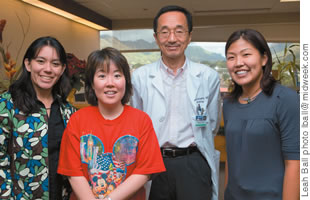Eat Less And Move More
Interviewed by Melissa Moniz
Wednesday - December 10, 2008
E-mail this story | Print this page | Comments (0) | Archive
 Del.icio.us Share
Del.icio.us Share

Dr. Osamu Fukuyama
Cardiologist
Interviewed by Melissa Moniz
Where did you receive your schooling and training?
I did my undergraduate studies at the University of California at Berkeley, then UH for medical school and residency, and finally, Barnes-Jewish Hospital/Washington University in St. Louis for cardiology fellowship.
How long have you been practicing?
Since 1982.
What have been the biggest changes in the field since you’ve started?
Probably the biggest change is that the patients are getting much older. In general, they are healthier and living longer, so the average age of my patients is now 75-80. In addition, the Internet has allowed patients greater access to healthcare information and health-care professionals. Still, while the patients are better informed, they are still not as well-informed as they should be in terms of making an informed decision.
Have there been any notable new findings that have really changed the way people look at cardiovascular disease and prevention?
There is a broad misconception, even among healthcare professionals, that the latest magic pill or spectacular technological advancement will revolutionize the treatment of cardiovascular disease. Certainly there are medications that do really cut down the risk as well as the mortality from heart disease, but unfortunately there really isn’t a magic pill. Do you know what the most effective strategy is that people don’t talk much about? It’s really very simple: Eat less and move more.

|
That alone would have the greatest and longest-lasting impact on the lives of everyone. If everyone did what they should be doing, which is to eat less and move more, I believe the numbers for heart disease would be cut in half. Nothing else can make that much of an impact. Diet and exercise are the most important things to do. Here in America, only 25 percent of the population meets the criteria for even the minimum amount of recommended daily activity, which is only 30 minutes of aerobic activity five times a week. We know that the more active you are, the less your chances are of getting sick not only from heart disease, but also from cancer, diabetes, high blood pressure and even viral illnesses.
You mentioned eating less. Is it just eating less or should people be avoiding certain foods?
We are all guilty of overeating as well as eating the wrong kinds of foods. We know that the fewer calories you take in, the longer you live. I believe that less than 5 percent of the population is eating less than the recommended daily caloric intake of 2,000 calories per day. Most people are eating way over that amount.
We know that foods high in saturated fats are bad for you. However, if you eat a diet rich in fruits and vegetables, whole grains and only moderate amounts of unsaturated fats, you have less of a chance of developing not only heart disease, but also cancer, diabetes, etc. Many diseases are known to develop as a result of what we eat. Genetics also plays a part in the disease process, but at this time, since you can’t significantly control your gene makeup, realistically, you have to focus on those factors you do have control over, which are diet, physical activity and lifestyle changes (smoking, drinking, drugs).
How early can you detect cardiovascular disease and what are the ways to detect it?
If someone dies at the age of 20 and an autopsy is performed, there already will be evidence of some mild blockage in the blood vessels. When you think about it, blood vessels are like pipes. After about five years, some junk accumulates in the pipes even though it isn’t causing any problem yet, because water can still pass through.
At what point should someone come in to see how clogged their blood vessels are?
I think it’s misleading to focus solely on finding out the exact degree of blockage there is. Any patient over the age of 40 will likely have some evidence of blockage or so-called plaque, because the buildup of plaque occurs naturally over time. I guess what I’m trying to say is it’s more important to focus on the slowing down or prevention of further buildup rather than to focus only on knowing the degree of blockage a person has, especially in a patient who is not experiencing any symptoms. Since most middle-aged people will have some degree of blockage just as a natural process of aging, and we know the buildup process will continue throughout one’s lifetime, then we really need to focus on prevention.
Is there any way to eliminate buildup in the blood vessels?
You cannot eliminate buildup in the blood vessels because we all have some amount of thickening in the arteries, and this is just a natural process of living and aging. But we can try to prevent further buildup as well as ruptures by again focusing on diet, exercise and lifestyle changes.
What do you see as the future of cardiology?
For the next 10 years or so, I think the most important thing we need to do is to go back to the basics and focus on risk-factor modification through diet, exercise and lifestyle changes. This is a simple but tried-and-true method of reducing the risk of heart disease as well as other diseases, and it has the added benefit of improving our personal health as well as overall quality of life. For example, if we can cut down obesity and inactivity by half, then we could probably decrease the number of heart attacks by at least 30 to 40 percent. Now that would be really powerful.
E-mail this story | Print this page | Comments (0) | Archive
Most Recent Comment(s):













